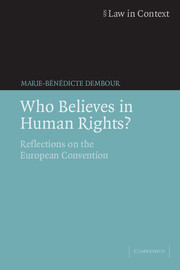Book contents
- Frontmatter
- Contents
- Acknowledgements
- Table of cases
- List of tables
- 1 Introduction
- 2 The Convention in outline
- 3 The Convention in a realist light
- 4 The Convention in a utilitarian light
- 5 The Convention in a Marxist light
- 6 The Convention in a particularist light
- 7 The Convention in a feminist light
- 8 The human rights creed in four schools
- 9 Conclusion: In praise of human rights nihilism
- Appendices
- Select Bibliography
- Index
8 - The human rights creed in four schools
Published online by Cambridge University Press: 03 February 2010
- Frontmatter
- Contents
- Acknowledgements
- Table of cases
- List of tables
- 1 Introduction
- 2 The Convention in outline
- 3 The Convention in a realist light
- 4 The Convention in a utilitarian light
- 5 The Convention in a Marxist light
- 6 The Convention in a particularist light
- 7 The Convention in a feminist light
- 8 The human rights creed in four schools
- 9 Conclusion: In praise of human rights nihilism
- Appendices
- Select Bibliography
- Index
Summary
[T]he strength of the thread does not reside in the fact that some one fibre runs through its whole length, but in the overlapping of many fibres. (Wittgenstein)
Finally, we come to the question: what are human rights? There is no single answer to this question because it depends whom you ask. In support of this admittedly controversial contention, this chapter seeks to map out the various concepts of human rights which are encountered in human rights scholarship. Its primary aim is therefore descriptive rather than normative: documenting and making sense of the way the expression ‘human rights’ is used rather than propounding a particular theory as to how the concept should be understood. I suggest that there are four main concepts of human rights which are in competition with each other. To present them in the briefest manner, those I call ‘natural scholars’ conceive of human rights as given; ‘deliberative scholars’ as agreed; ‘protest scholars’ as fought for; and ‘discourse scholars’ as talked about.
I attach these four concepts to four ‘schools’. The term ‘school’ came to me as I was writing about various ‘scholars’. It is admittedly misleading. The scholars I bracket together do not necessarily know each other and may not wish to recognize themselves in the groupings I have created. Moreover, I believe that the concepts I have identified are not peculiar to the scholarly world but are also found in the way ‘lay’ people conceive of human rights. However, a term needs to be used.
- Type
- Chapter
- Information
- Who Believes in Human Rights?Reflections on the European Convention, pp. 232 - 271Publisher: Cambridge University PressPrint publication year: 2006



